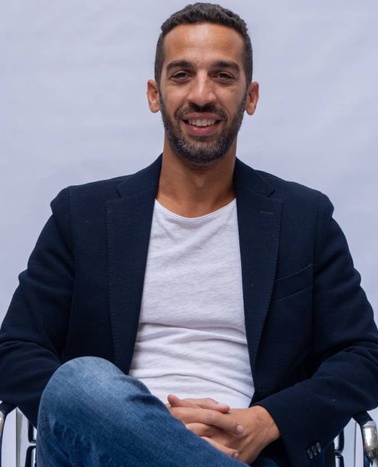
Mohamed Lebda
I am Mohamed Lebda, an Egyptian-born entrepreneur and financial expert, recognized for my innovative approach to banking. With a strong foundation in engineering and international business, I earned a Bachelor of Science in Mechanical Engineering from the American University in Cairo. After spending four years working alongside my family, I was inspired by the political and economic shifts in Egypt to expand my knowledge of global finance and economics.
In 2011, I graduated with an International MBA from IE Business School, where I gained new perspectives, a global network of emerging market leaders, and a newfound passion for banking. My career in finance began with a five-year tenure at UBS, where I joined the Wealth Management Associate Program. My expertise was further honed when I was recruited by Citibank, where I served as Senior Vice President, specializing in private banking in Dubai for seven years. With this extensive experience, my drive to make a meaningful impact in banking led me to pioneer a new, innovative model of online banking, deeply rooted in my personal motivations and background.
Today, I am the founder and CEO of IWM Zurich , a Swiss-based AI-first neobank dedicated to providing secure, accessible, and innovative banking services to individuals from emerging markets. By combining my engineering background, banking expertise, and global insights, I lead IWM Zurich in delivering cost-effective solutions for clients worldwide, working to redefine the future of finance.

“Keep pushing”
Q&A WITH MOHAMED
What’s the story behind IWM Zurich?
The story behind IWM Zurich is very correlated to my personal story. I come from Egypt, a country that’s experienced multiple currency devaluations in the past 10 years—around 70 or 80% in total. I’ve seen firsthand how friends, family, and people in my affluent community have faced financial traumas, fearing for their financial well-being. One way they try to diversify out of their home economy is by seeking a safe bank account in a more stable jurisdiction.
Switzerland is one of the world’s leading jurisdictions, managing about 25% of global private wealth. Spending years with top-tier banks like UBS and Citi, I saw why they require high minimum balances or expect clients to generate significant revenue, especially for those from emerging markets. The regulator demands enhanced due diligence when onboarding clients from places like Egypt, Peru, or Nigeria, which involves a lot of manual work. Every transaction has to align with the client’s story, and it all needs to be documented. Over the past 15 years, as regulations tightened, banks moved up the wealth ladder—now, UBS’s minimum for clients from emerging markets is $1 million, making it less accessible for emerging markets.
IWM Zurich is a Fintech company, not a bank. Can you explain to the layman how your company works?
So, in the past 18 months, we came up with a value proposition where people from emerging markets can open a Swiss bank account with IWM Zurich, get access to Goldman Sachs investment products, have a Mastercard debit card that works on Apple Pay or Google Pay—available in plastic or metal, which some people prefer—and a dedicated relationship manager. This offers 80-90% of what you’d get with UBS, but with no minimum balance.
We achieve this by reducing the cost of onboarding and banking by 10x, thanks to software we’ve built. It’s faster, more intuitive, and allows us to bring these services at a fraction of the cost.
What makes this even more exciting is that we've been able to augment our relationship managers by integrating an AI agent to support them. With my co-founder, who’s an applied AI engineer, we realized that a large language model (LLM) agent could dramatically increase productivity.
Being both a business founder and CEO involves wearing multiple hats. How do you balance these roles, and in what ways does this balancing act influence your perspective on business and leadership?
For me, being both founder and CEO means setting top-notch standards for ourselves. I know what I signed up for. If we’re average, we’ll die—most startups die. To make it, we have to be in the top 3%. That requires us to work very, very hard, work very, very smart, and stay on a mission.
I’m very, very lucky to have young associates who learn fast and become like an extension of myself. I have one in finance and projections, another in marketing and PR. I have to be involved in everything, but there’s no way to do everything myself. We rely on each other and put in 12-plus hours, sometimes 6 days a week, and we don’t feel tired because we really, really love what we’re doing.
I left a corporate job that was very comfortable, where I was Senior Vice President at Citibank, and now I make 30% of what I used to. My co-founder and I are really obsessed with this idea of creating an efficient bank that people would love, not like the banks they dislike now. My motivations are clear: first, building this efficient, modern bank; second, working on the cutting edge of technology, where AI and Fintech are taking us; and third, to be very blunt and transparent, to improve my financial situation and my family’s.
Are entrepreneurs born or made?
I think they are born. I think the good entrepreneurs are usually the extremes - the ones that have some extreme in their character. Because balanced people cannot balance that level of risk. I don't think balanced people could take it, even if it becomes fashionable to do a startup.
Can you share a moment when you faced a significant challenge and how your leadership style helped navigate through it?
The business model of IWM Zurich was something that hadn’t been done before. One of the biggest challenges was convincing various service providers, like banks, Mastercard, and cross-border payment providers, to work with us. At least 50 times, we were told, “No, this cannot work.” Mastercard Switzerland, for instance, told us five times it wouldn’t work, and now we offer the card.
A challenge I particularly remember is finding a Swiss bank to partner with. The big names—Deutsche Bank, UBS, Citibank—weren't an option. They weren’t set up to create the APIs we needed to build our platform on top of them. Also, they’re not interested in foreign clients unless they have at least a million dollars. That’s when we found a small bank willing to work with clients from these markets, expanding our addressable market from day one. We convinced them to create APIs we could connect to, which was crucial since, without this integration, we wouldn’t even have a business.
But when I started talking to potential clients, including some IE alumni, I heard concerns, including that the bank was not a big name - like Citi or HSBC - "How can we trust this?" So we went back to our partner bank, and through persistence, leadership and a lot of persuasion, we got the bank on board with Goldman Sachs Asset Management. Now, affluent clients can open accounts with our sponsor bank, but their money sits with Goldman Sachs-one of the safest banks in the world. This was only possible through relentless pushback, persistence and a clear vision, and it helped secure the trust of our clients.
What advice would you give to aspiring entrepreneurs and finance professionals focusing on the fintech industry?
The first thing is to speak with clients and potential clients. Understand your problem clearly, and be able to communicate the problem and your potential solution very, very clearly. A large part of my job is communicating what I do. You will need support—from your alumni, from your investors, from your personal network to put in the initial family and friends rounds. And the more clarity you have, and the more of an expert you become in the problem and the domain you're solving, the more credibility you get, the more help you get from people, and the better your chances are.
The second is that it is extremely hard. You need to set up your mindset around resilience and perseverance and grit. If you don’t have that, don’t go for it—it’s not for everyone. These are the two things.
Define your experience at IE in one word.
Exposure.
In what ways do you think the program has changed your life professionally and personally?
The program exposed me to many, many industries in a very short period of time. By going through cases and by meeting people who have been working for a decade in this industry before joining, by meeting colleagues, it opened up my horizon on what's possible in different industries. I learned how things are done, what could be copied from one industry to another, and the strategies companies use—how they protect their market share, how they penetrate new markets. It really exposed me.
I was a mechanical engineer, and this was a whole new level of insight for me. The second part is the network. I now know someone or have an alumni network that I could go back to whenever I need anything. I’m also very, very proud that I add value to the alumni network whenever I’m called upon. For instance, my dear friend Joe Sphere, who was handling the Middle East alumni network—it’s really about being part of that community and giving back. The program changed my life by opening my horizons and providing this incredibly valuable network.
What can alumni do to create a positive impact, not only within the IE community but also for the rest of the world?
Listen, everyone's an expert on something, and everyone has a network. Most alumni have been working for a decade, half a decade, or even two or three decades. Everyone has expertise in something and a network. So, opening up your network and expertise, and dedicating a little bit of your time to fellow alumni changes lives. It really changes lives. And I also ask alumni who are seeking help, advice, or a connection in a specific area to communicate concisely. That’s how you can create a positive impact—not only within the IE community but for the rest of the world.
How is the Mohamed of today different from the Mohamed who graduated from IEU?
When I graduated from IEU, I was eager and motivated, but now, with all humility, I would call myself a domain expert in banking and specifically in private banking, and even more narrow it down in offshore private banking. I understand it inside out. I’ve done it for 10,000 hours at least. I’ve lived in five different countries, which expanded my perspective significantly. I used to be able to do 15-16 hours of work a day when I was all in, but now, 10 years older, I can only do 12-13 hours of work per day. By the end of the day, my focus is horrible.
If you had a billboard that you could display to the world, what would you write on it?
Keep pushing.